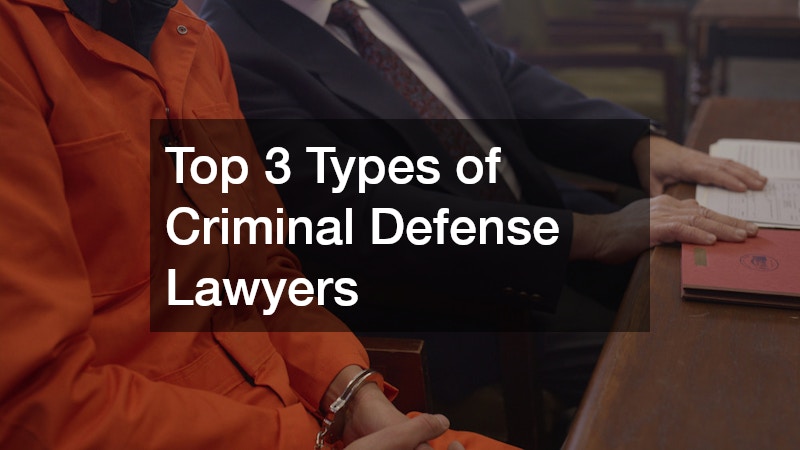
Explore the world of criminal defense lawyers and the critical roles they play in the justice system. Discover the top three types of criminal defense lawyers and how they specialize to protect their clients’ rights.
1. What are the main types of criminal defense lawyers?
Public Defenders
Public defenders are appointed by the court to represent clients who cannot afford private legal representation. These lawyers play a crucial role in maintaining the principle that everyone has the right to a fair trial, regardless of financial status.
Despite heavy caseloads and limited resources, public defenders strive to provide competent and effective defense for their clients. The challenges they face often stem from insufficient funding and the overwhelming demand for their services.
Public defenders must balance advocating fiercely for their clients with navigating the systemic limitations of the public defense system. Their dedication to justice ensures that the rights of the accused are protected throughout the legal process.
Private Criminal Defense Attorneys
Private criminal defense attorneys are retained by clients who possess the means to afford personalized legal representation. These lawyers tailor their services to meet the unique needs of each client, providing thorough case management and dedicated attention.
The relationship between private attorneys and their clients is often characterized by extensive communication and strategic planning. Retaining a private attorney can offer the client access to more resources and specialized expertise.
Despite the advantages of private legal counsel, the cost can be prohibitive, limiting access to individuals in lower socio-economic brackets. This disparity emphasizes the importance of public defenders, who fill a crucial gap in the justice system.
2. How do defense strategies differ among various types of lawyers?
Negotiation Strategies
Defense lawyers utilize negotiation strategies to procure favorable plea deals for their clients. These strategies often involve assessing the strengths and weaknesses of the case and the willingness of both parties to reach a compromise.
Factors influencing negotiation strategies include the nature of the charges, the available evidence, and the client’s preferences. Negotiations are a critical tool for resolving cases without the need for a trial, saving time and resources for the court system.
Successful negotiation requires not only legal expertise but also strong communication and persuasion skills. Defense attorneys must navigate these complex interactions to ensure the best possible outcomes for their clients.
Trial Defense Techniques
During a trial, defense lawyers employ a variety of techniques to present the strongest case possible for their clients. This includes selecting a sympathetic jury and skillfully cross-examining witnesses to introduce doubt.
The choice of defense technique often depends on the specifics of the case and the type of crime. For example, defending an individual accused of white-collar crime may require different tactics than a violent crime defense.
Trial defense requires adaptability and acute legal acumen to respond to the dynamic nature of courtroom proceedings. Ultimately, these techniques aim to present facts in a manner that resonates with the jury’s sense of justice.
3. What qualifications must criminal defense lawyers possess?
Educational and Licensure Requirements
Criminal defense lawyers must complete a rigorous educational path, typically starting with a bachelor’s degree followed by a Juris Doctor (JD) degree from a law school. Success in passing the bar exam is a critical requirement for obtaining licensure to practice law.
Continuous legal education is essential for criminal defense lawyers to stay updated with evolving laws and regulations. This ongoing education allows them to provide the most current and effective defense strategies for their clients.
The licensure process ensures that lawyers meet high standards of competence and ethical practice. This is vital for maintaining the credibility and integrity of the legal profession.
Special Skills and Expertise
In addition to formal education, successful criminal defense lawyers possess specific skills such as negotiation, critical thinking, and courtroom presence. These skills enable them to craft compelling arguments and achieve favorable outcomes for their clients.
An adept defense lawyer must also be proficient in legal research and have a keen understanding of the judicial process. As legal landscapes change, adaptability and continuous learning become indispensable traits.
Mastery of these competencies sets exceptional defense lawyers apart, ensuring they can effectively advocate for their clients and protect their legal rights. The combination of education and special skills fortifies their ability to navigate complex legal challenges.
4. How do specialized defense lawyers cater to different types of crimes?
White-Collar Crime Defense
Defense lawyers specializing in white-collar crime handle cases involving financial crimes, fraud, and embezzlement. These cases require in-depth knowledge of financial systems and regulatory compliance to devise effective defense strategies.
Effective defense in white-collar cases often hinges on interpreting intricate financial data and challenging the prosecution’s evidence. Expertise in this area also includes understanding corporate governance and forensic accounting.
White-collar defense lawyers must be resourceful and adept at identifying weaknesses in the prosecution’s case while offering alternative explanations for the alleged misconduct. Their role is crucial in cases with significant financial implications.
Violent Crime Defense
Lawyers defending clients accused of violent crimes adopt approaches focused on gathering robust evidence and eyewitness testimonies. These cases often involve serious accusations such as assault, robbery, or homicide.
The defense strategy in violent crime cases may include questioning the reliability of witness testimony and police procedures. It is essential to scrutinize every aspect of the case to ensure the accused’s rights are upheld.
In violent crime defenses, the stakes are high, requiring intense preparation and meticulous attention to detail. The lawyer’s ability to weave a compelling narrative that contradicts the prosecution’s claims is vital for securing a favorable verdict.
Conclusively, criminal defense lawyers come in various forms, each with unique roles and specialization areas. Recognizing the distinct functions they serve enriches our understanding of the justice system and the protection of legal rights.




